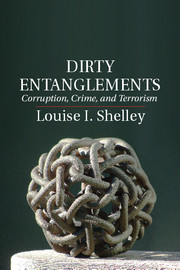Book contents
- Frontmatter
- Dedication
- Contents
- Figure, Maps, and Tables
- Acknowledgments
- Introduction
- Part I The Logic of Corruption, Crime, and Terrorism
- 1 Crime and Corruption behind the Mass Attacks
- 2 Corruption
- 3 The Evolution of Organized Crime and Terrorism
- 4 Environments, Global Networks, and Pipelines
- Part II The Diverse Businesses of Terrorism
- Index
- References
4 - Environments, Global Networks, and Pipelines
Published online by Cambridge University Press: 05 August 2014
- Frontmatter
- Dedication
- Contents
- Figure, Maps, and Tables
- Acknowledgments
- Introduction
- Part I The Logic of Corruption, Crime, and Terrorism
- 1 Crime and Corruption behind the Mass Attacks
- 2 Corruption
- 3 The Evolution of Organized Crime and Terrorism
- 4 Environments, Global Networks, and Pipelines
- Part II The Diverse Businesses of Terrorism
- Index
- References
Summary
A diaspora cell of Bosnian refugees residing in Raleigh, North Carolina, whose members knew each other through the mosque and the local Moslem community were charged in 2009 with conspiring to provide material support to terrorists and to murder, kidnap, maim, and injure persons abroad. They were aided by an American convert to Islam, Daniel Boyd, and his two sons. Boyd had a criminal record: he was arrested for bank robbery in Pakistan in 1991. The Raleigh-based cell was working with a Bosnian in Kosovo, Barjam Asliani, who once lived in the Raleigh area. Asliani sought the cell’s help in raising money to establish a base in Kosovo to wage jihad. The FBI agent in charge stated, “This case began in Raleigh, N.C. and now stretches across the globe, a circumstance no one would have thought possible less than 10 years ago.”
This case illustrates a central theme of this chapter – networks are truly global, and criminal activity and planned terrorist acts are often entangled. This case fused components in the United States, Europe, and Asia. But, as we see in this chapter, networks may combine many more and even more diverse regions than the Raleigh example.
- Type
- Chapter
- Information
- Dirty EntanglementsCorruption, Crime, and Terrorism, pp. 132 - 170Publisher: Cambridge University PressPrint publication year: 2014



